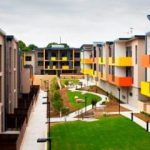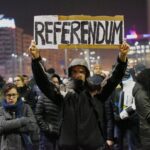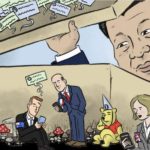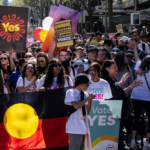Enjoy a COVID-free Christmas
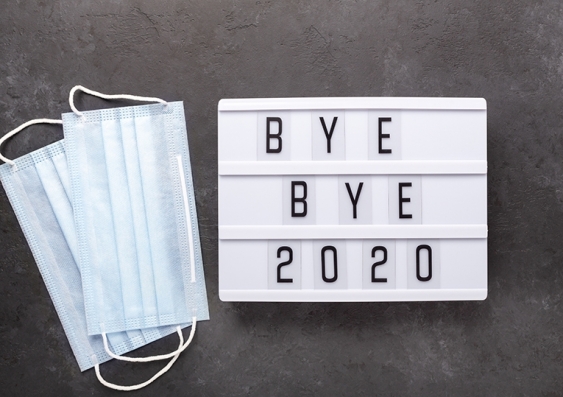
With states now opening up borders, negligible community transmission of COVID-19 and a record against the pandemic that is the envy of the world, you could be forgiven for thinking this holiday season will be a return to normal.
But according to four COVID-19 experts at UNSW Sydney, festivities this year will be very different.
Professor Raina MacIntyre, epidemiologist and head of the Biosecurity Research Program at the Kirby Institute, says that while we are lucky to live in a country that has done so well in managing COVID-19 compared to the rest of the world, travelling interstate could still be a risky proposition until we get our hands on a vaccine.
“The situation will remain fluid and can change at any time,” she says. “You may end up stuck or in lockdown if there’s a sudden local outbreak. We can still boost tourism, but why not think about doing it in your own state?”
But Prof. MacIntyre thinks that with new vaccines emerging, the outlook for 2021 is a bit more auspicious than the annus horribilis that was 2020.
“I would expect to see the first tranche of vaccines available next year, and that will be a turning point,” she says.
“The data look promising so far, so we can be optimistic about the prospect of effective vaccines in the near future.”
But for now, we still need to live with the uncertainty. What about the holiday season festivities like Christmas, New Year, or end-of-work parties – what is the best way to celebrate?
Prof. MacIntyre says provided we take the right precautions, there’s no reason to cancel that Christmas or end-of-year get-together.
“Restrict the size of your gatherings, and plan your events outdoors if possible – like a backyard BBQ or picnic. Outdoors is much safer than indoors,” she says.
“If indoors, keep windows open and ensure good ventilation. If you do not have good ventilation, think about an air purifier. Air-conditioning in-home AC systems simply recycle the air, so this is not adequate. Use social distancing and try to keep people spaced apart. And use masks when not eating.
“You can even ask guests to be COVID-safe in all possible ways for the two weeks prior to your big event – so things like staying away from crowded places, using masks and practising social distancing – to minimise the risk of introducing infection into your gathering.”
Complacency fears
Professor Mary-Louise McLaws, a World Health Organisation advisor and epidemiologist from UNSW’s School of Population Health, is worried that Australia’s great record to date in flattening the curve could lead to a false sense of security this holiday season.
“Holiday season this year should be different to any we’ve experienced before,” she says.
“But I am concerned that after the celebrations of Victoria overcoming the second wave – which is an enormous achievement – Australians will have interpreted this as ‘we are home-free’ and fail to keep physical distancing.”
She thinks public transport is likely to become more crowded and wonders whether mask wearing will become rarer, no longer seen as the ‘new norm’. But she thinks travel around the country needn’t be ruled out completely, so long as we continue to observe the precautionary behaviours we’ve adopted thus far.
“Traveling around Australia has a risk; staying at home in your own city has a risk – albeit low,” she says.
“But if we use masks when using public transport, keep indoor ventilation to capacity with 100 per cent fresh air exchange, stop raising our voices in public places, wear a mask into and out of mass gathering sites – and in transport to and from the gathering – we should be as safe as it is possible during the pandemic.”
Prof. McLaws says even with vaccines potentially rolled out next year, it could be some time yet before we’re well and truly out of the woods.
“The rollout of the early vaccines to high-risk groups may make the public think the pandemic is all over – it won’t be,” she says.
“There is always a proportion of people vaccinated who are not protected and I’m hoping it will be as low as 10 per cent.
“So when we all start to travel, we will see people still being infected and this disease won’t rapidly disappear – unlike what happened with SARS – for many years.”
Prof. McLaws says for this holiday season, it is important to understand the risks could always be lurking just outside of your circle of friends and family.
“Keep the celebrations outdoors when entertaining those outside your family ‘germ bubble’.
“Keep the numbers low and enjoy smaller gatherings. Keep the time between gatherings to 14 days to give the opportunity for infections to surface, so infection isn’t passed on to the next gathering.”
Practicing what they preach
Abrar Chughtai
“My family is in Canada and I visit them at this time of year every two years. Of course, we can’t travel overseas so I will be spending the holidays in Australia. I plan to go to Canada next year, but even then, I’m not that sure I will be able to go or not – it depends on how effective any vaccine will be.
“So this year I’m thinking of traveling within NSW to the south coast to have a beach holiday at a resort if there are no local community cases by that time – I’m thinking December or early Jan, it’s a case of wait and see.”
Bill Rawlinson
“This year will be very different to previous years mainly because we will only travel locally within NSW. It’s a good opportunity to try to support local businesses and tourist operators as we are all in this together, and we are getting out of this together.”
Mary-Louise Mclaws
“For us birthdays are the big celebration and unfortunately some of our family were in lockdown in Victoria and another safely outside the city.
“This year the season will be like all other (I never realised we were practising for COVID!) with lunch outdoors. We have cancelled a holiday in the Middle East and the realisation that we may not see our friends there for several more years is difficult.
“We will do what we have always done in January – catch up with friends we neglect during the year. We usually cook and seat as many friends at the table that it can hold, 14, but this year we will cook for small groups of friends and eat outside. NYE celebrations will be with the usual friends who are in our germ bubble and it’s always outdoors and low key. But this year we will celebrate the achievement of getting through a challenging year for us all and grateful for survival.”
Raina Macintyre
“We are having a smaller Christmas gathering and I have asked people who are attending to be COVID-safe leading up to Christmas. We will have an indoor-outdoor event with doors and windows open and an air purifier running. Guests will be seated with spacing between them and all wear masks except when eating or drinking. We won’t be going anywhere for holidays this year.”
Stay local, support local
Professor Bill Rawlinson, a virologist with UNSW’s School of Medical Sciences, is another expert who thinks limiting travel to within the state is preferable, noting the states are more likely to act early and therefore limit the length of shutdown, following the experience of Victoria.
“It seems clear travelling within the state looks good at this stage,” he says. “The SA experience is that this can change very quickly, although we are seeing shorter shutdowns than previously, and quicker return to normal within a state.
“Interstate travel is more problematic, and clearly differs between states. I’d hope this will ease and remain eased, although again it is likely to be more changeable.”
As for his outlook for 2021, Prof. Rawlinson is cautiously optimistic for two reasons.
“I think the vaccine will make a difference to people’s confidence and will make a pragmatic difference by increasing the number of immune individuals – herd immunity is a vaccine concept rather than an infection concept.
“There are now good results from vaccine trials, most recently the mRNA Moderna vaccine, which means three large studies have been completed (AstraZeneca-Oxford, Moderna-NIAID, Pfizer). The level of this achievement in terms of timing, use of new data and global collaboration should never be underestimated. The effect of these vaccines on reducing disease based on studies to date should be recognised.
“The other change appears to be related to the virus, with some emerging evidence of reduced virulence, although it’s early days.”
Prof. Rawlinson says for anybody worried about the safest and most responsible way to celebrate holiday season, they should “take account of the reliable websites – Commonwealth Health and those of various health authorities in your state”.
“I say to start here because there is a lot of information out there, and it’s not all reliable.
“The other message I’d emphasise is things have not changed that much – the virus still circulates, it still spreads, and the messages about how to avoid it and protect yourselves as well as others have not changed.”
Change in the weather
Dr Abrar Chughtai, who is an epidemiologist with the School of Population Health, says so long as states are able to maintain zero community transmission of COVID-19, travel interstate should not pose many problems. Also in Australia’s favour is the fact that the holiday season accords with our summer.
“If we look at the global data, large epidemics are much more likely to occur during the winter season,” he says.
Nevertheless, travel within a state is relatively safer and should be the preferred option, he says.
On the question of when we could expect a return to the ‘old normal’, Dr Chughtai thinks that provided the vaccines are rolled out throughout next year and are effective without major side effects, a semblance of normality could return by the end of next year.
But in the meantime, Dr Chughtai echoes his fellow UNSW academics in suggesting limiting gathering sizes, holding functions outdoors if possible, maintaining social distancing and good hygiene practices. The biggest risks, he says, are in publicly staged events such as the New Year’s Eve fireworks.
“Of course it’s an outdoor gathering, so that lowers the risk, but it’s also a very large gathering where people converge at the one place. And to get to that place a lot of them have to use public transport.
“If you really do want to see the fireworks, see if you can view them from pockets around the city. But in terms of public gatherings, I think the fireworks are a bit risky at this stage.”
Lachlan Gilbert is a media manager and content producer for the University of New South Wales.








